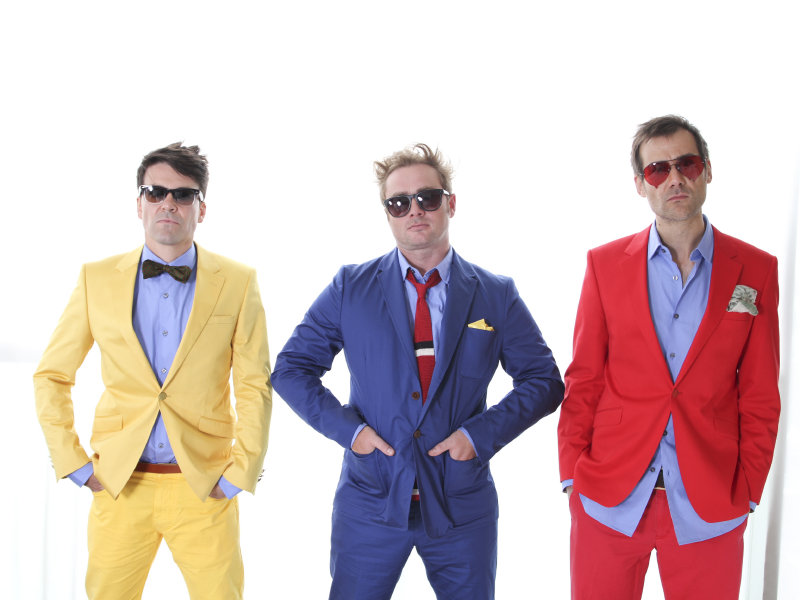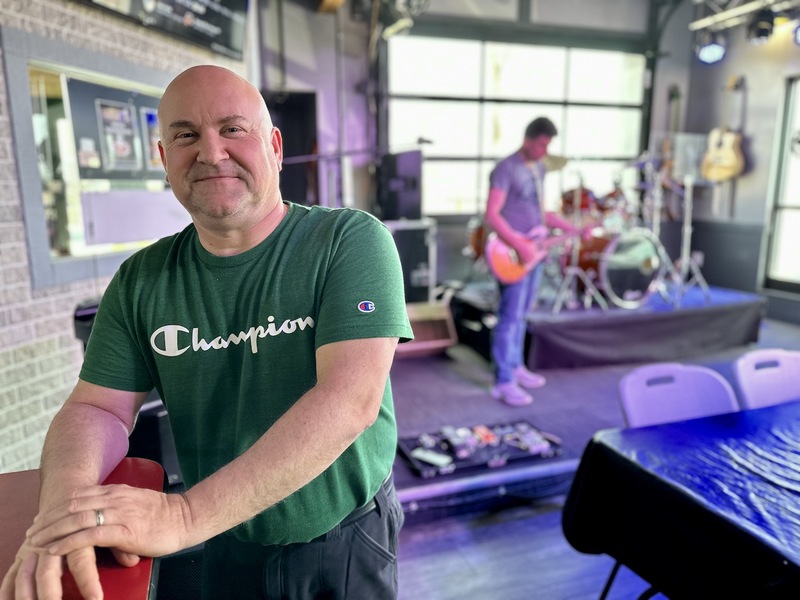Spacehog was in a very different place last time it played in Milwaukee. It was July 1, 2001, at the Summerfest rock stage, and Spacehog was promoting its new album "The Hogyssey."
That turned out to be the last major tour for the band from Leeds, although Spacehog began reuniting a few years ago and finally launched its fourth album, a crowd-sourced disc "As It Is On Earth," this spring.
Now, they’re back on the road, playing small clubs. Older, wiser but still prone to bouts of rock, we talked to drummer Jonny Cragg in advance of Spacehog’s Dec. 13 show at Sturtevant’s Route 20.
OnMilwaukee.com: I’ve seen Spacehog three times in Milwaukee over the years, and I got to tell you I never expected to see a fourth. Is this part of the master plan by Spacehog?
Jonny Cragg: Not really. I mean the master plan was not really to break up in the first place, but, sh*t happens, right? We took a break. We got back together again in 2006. Tentatively started making another record, and here we are in 2013 touring it.
OMC: I don’t know if you remember your Summerfest, but they were amazing. The show that really stands out to me was back in 1997 at a small club called Shank Hall.
JC: I remember it, yeah.
OMC: People ask me about my favorite shows of all time, and that always comes up because you guys had such a huge sound, and it was such a tiny room. There were like a hundred people there and it felt like I was getting my own personal concert.
JC: That’s amazing, isn’t it?
OMC: On your Twitter profile, you guys call yourselves the only remaining rock band on earth.
JC: That’s right.
OMC: Talk about that a little bit.
JC: Obviously, we’re being slightly humorous. Is this my queue to bemoan the modern music industry? I don’t know. There aren’t that many rock bands. There aren’t that many great bands extolling the virtues that we were brought up to appreciate. Namely Queen and The Police and The Smiths, and all the classic groups. They're a dying breed, aren’t they? I just feel like that kind of greenhouse to produce music with the fidelity of the same band members throughout, it’s not necessarily there anymore. It’s not there in New York.
It’s not there globally, because the art is fallen out of the industry. It’s hard for these younger kids to have those virtues of a band with people contributing equally to the sound of the music and the parts and the lyrics. Rather than it just be in the celebrity driven drivel.
OMC: The first album definitely was probably the most rock driven one but the first three all really had that same kind of sound. But the new album I found to be a lot more mellow, and I was a little bit surprised about that.
JC: Look, we’re getting old, mate. We can’t do the fast top anymore. I’ve got my lumbago to think about. I don’t want to get my arms tired by playing too many fast songs all at once.
OMC: Seriously, the sound does sound pretty different to me. Was that on purpose or do you consider that an evolution of where Spacehog is going?
JC: Yeah. Seriously, we have grown up. Two of us have got families now and there’s been various things that have gone on personally along the way, and I think the music’s a reflection of that. When we’re sequencing the record where I wanted to make it a journey, it starts in a very somber place that is defeat and in the end a little bit more hopeful with songs like "Glad to Know." You know? The songs are cherry picked from like 20 years ago. Some of those songs in there are very old songs that have been retitled. Some of them are ones that we wrote literally as we were about to go and mix the record.
OMC: Tell me about "Oh, Dinosaur." That song to me sounds the most classic on the album. Classic Spacehog anyway.
JC: I’m glad you mentioned "Dinosaur" because it is basically the first song that myself and Richard (Steel) have written that’s kind of made the cut on a Spacehog record. We’re kind of the late bloomers of the band, compositionally. I think once Anthony left the band it sort of paved the way for us to step up a little bit. Roy always had a very developed song writing style and he comes in with things that are very finished and developed if only in mind. Anthony’s less so. I feel like to some extent there was a little bit more band involvement in Anthony’s one than perhaps in Roy’s.
Once he quit the band, somebody needed to get in there and try to do things. While the band had been broken up Richard did play in a couple of other groups, and been instrumental in some of that song writing. He’s written songs of his own. I’d been composing for television. We developed some chops to try and write songs and Dinosaur was the first step in what I hope will be a new paradigm of everybody sort of contributing to the compositions.
OMC: Is there more to come? Was this a one off thing or are you guys back for real?
JC: That depends on you guys. We can’t run on thin air. We have to be supported somehow by the fans. It really depends.
OMC: Would you like to continue Spacehog?
JC: I would love nothing more than to continue. It’s a wonderful band. I’ve been playing music many years and I’ve never ever been in a band that is this good. I look to my left and to my right and front and center and I see these three guys that I love and have always wanted to play music with, so to me it’s a dream come true to play music with Spacehog. It’s sometimes a bit of a nightmare trying to make it work.
OMC: Talk to me about crowd sourcing your new album. You guys raised money for the new album pretty quickly, right?
JC: We did. We made our goal in the first 24 hours, which was very gratifying.
OMC: It seems to me that the fans do want to hear more Spacehog.
JC: They do. We just need more of them to help us.
OMC: You’re playing at a pretty small venue in Racine, which is close to Milwaukee. Over the years you’ve played at some very big venues. What does it feel like to come back to that club scene? Is it kind of cool to come back to your roots like that?
JC: You shouldn’t be confused by perception. The perception may be that we played arenas, but if you look back at the arenas that we played, we never played them on our own. We always played them opening. We opened for the Red Hot Chili Peppers and for Pearl Jam and for Aerosmith. They were the only times we really played arenas. The rooms that we’re playing now are the same size rooms that we’ve always played on our own. I feel like we’ve pretty much played to the same amount of people but with varying opportunities for expansion.
The truth is when we started going in the ‘90s, we had those tools for expansion. We had a conventional record company, a large publisher, a very powerful manager, a very influential booking agent. We had all the tools at our disposal to make use look bigger than we really were. Now it’s like we just got to get on with it, and be who we are, and this is who we are. It’s the same show, it’s the same guys.
OMC: I want to mention a few of my favorite Spacehog songs. If you could just say a little something about each of these, that would be great. First, "The Last Dictator."
JC: I love that song. It was always a tricky one to play live. I don’t know why. I think vocally it was always a bit tricky. We never really embraced it when the first record came out. We re-investigated it when Timo joined the band. We were playing it for a while. Never really go its due, but it’s a great song. Love it.
OMC: OK. How about "Goodbye Violet Race?"
JC: "Goodbye Violet Race" was a song we recorded a few times, sort of in the pack, to go on Resident Alien. Never got on Resident Alien. Couldn’t for the life of me figure out why. I guess it was just because it was the ones that were queuing up in front of it. Wound up on The Chinese album which is possibly my favorite Spacehog record.
OMC: What about "Jupiter’s Moon?"
JC: A really crafty song. Again, written by Roy. It kind of recorded through a pretty dark period in the band’s history. The band had a lot of personal and internal problems. Perhaps at the behest of our record company at the time made the right record in maybe the wrong place. I don’t know.
OMC: It flew under the radar didn’t it?
JC: My only issue with that record is it’s just a little sonically to the left of the other stuff. It sounds great, but it’s just different. It wasn’t quite what we might have always envisioned.
OMC: The song, the "Hogyssey." The 2001 song. For some reason that always fires me up. It seems like the perfect song to put on a running mix. Did you guys have fun with that one?
JC: We had lots of fun. We used to jam it in the rehearsal room.I’m not sure who recorded that version. It was just a really uplifting, fun song. I don’t know what came first, the title of the record or the track, but I get some vague recollection that we decided to call the record the Hogyssey and then it was like, "Why don’t we record this thing that we do." And we did.
OMC: In all the press and all the publicity I hear Spacehog described as a ‘90s band, but I guess I’ve never thought of you guys like that. I just thought of you as a great rock band. Does that bother you to be labeled like that or is it something you’re proud of?
JC: No. I’m not proud of it. I’m not bothered by it either. It’s just, it’s another label to make it convenient for people to identify with. If we can appeal to some kind of nostalgic time in the public’s life, then that’s great. We’re not trying to trade that too much.
Andy is the president, publisher and founder of OnMilwaukee. He returned to Milwaukee in 1996 after living on the East Coast for nine years, where he wrote for The Dallas Morning News Washington Bureau and worked in the White House Office of Communications. He was also Associate Editor of The GW Hatchet, his college newspaper at The George Washington University.
Before launching OnMilwaukee.com in 1998 at age 23, he worked in public relations for two Milwaukee firms, most of the time daydreaming about starting his own publication.
Hobbies include running when he finds the time, fixing the rust on his '75 MGB, mowing the lawn at his cottage in the Northwoods, and making an annual pilgrimage to Phoenix for Brewers Spring Training.







